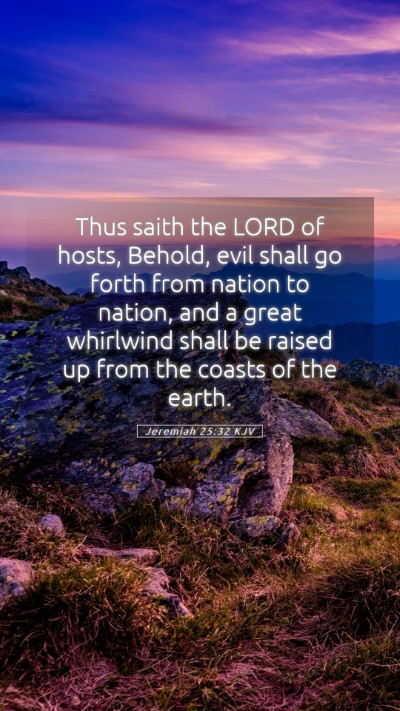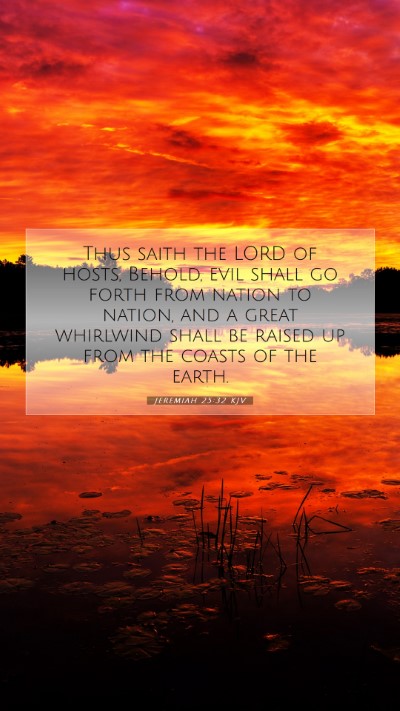Understanding Jeremiah 25:32
Jeremiah 25:32 states: "Thus saith the Lord of hosts, Behold, evil shall go forth from nation to nation, and a great whirlwind shall be raised up from the coasts of the earth." This verse is one of the prophecies delivered by the prophet Jeremiah, warning of impending judgment and calamity. In this summary, we will explore various Bible verse meanings, Bible verse interpretations, and Bible verse explanations based on insights from public domain commentaries.
Contextual Background
Jeremiah prophesied during a tumultuous period in Israel’s history, marked by the imminent threat of Babylonian invasion and a call to repentance. This scripture serves as a prophetic declaration of the consequences of disobedience to God and the inevitable judgment that will ensue. According to Matthew Henry's commentary, Jeremiah articulates this prophecy not only as a warning but also as a demonstration of God's sovereignty over all nations.
The Significance of "Evil" and "Whirlwind"
The term "evil" in this verse refers not merely to moral wickedness but encompasses the calamities and disasters resulting from divine judgment. Albert Barnes notes that the use of "whirlwind" symbolizes the swift and uncontrollable nature of God's judgment, suggesting that trouble will arise unexpectedly and spread rapidly across nations. Understanding the symbolism in biblical texts can provide valuable Bible study insights for believers today.
God's Sovereignty and Judgment
This verse emphasizes God's control over the course of history and nations. As Adam Clarke elaborates, the chaos represented by 'a great whirlwind' signifies both God's wrath and His ability to orchestrate world events. This understanding aligns with broader themes of biblical exegesis concerning God's justice and the ultimate accountability of nations before Him.
Implications for Believers
For modern readers, Jeremiah 25:32 serves as a solemn reminder of the consequences of turning away from God. It challenges believers to reflect on their own lives and societies and consider the weight of their decisions. This verse can inspire discussions in Bible study groups about how the principles of divine judgment still apply in contemporary settings.
Related Cross References
- Isaiah 17:13: "The nations will roar like the roaring of the seas; and when he roars, they will roar like the roaring of great waters." This passage echoes the theme of chaos and judgment brought upon nations.
- Jeremiah 1:14: "Then the Lord said to me, 'Out of the north, disaster shall be let loose upon all the inhabitants of the land.'" This reference supports the upcoming judgment from the north, symbolizing Babylon's invasion.
- Zephaniah 1:14-15: "The great day of the Lord is near; it is near, and hastens greatly." This emphasizes the certainty and nearness of divine judgment.
Conclusion
In summary, Jeremiah 25:32 serves as a poignant reminder of God’s judgment and the importance of obedience to His will. The insights provided by classic commentators like Matthew Henry, Albert Barnes, and Adam Clarke reveal the depth of meaning within this verse. By studying Scripture in context, we gain a better understanding of the Bible, enhancing our Bible study tools and enriching our faith journey.
Further Study Suggestions
- Explore the historical context of Jeremiah’s prophecies and their relevance today.
- Discuss the implications of God’s sovereignty in contemporary issues during your next Bible study session.
- Examine other prophetic books in the Old Testament to draw parallels with Jeremiah's message.


